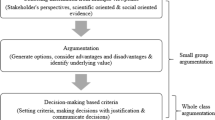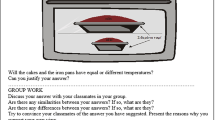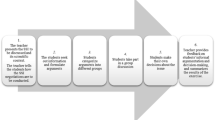Abstract
The development of students’ argumentation competence is one of the major aims of science education and everyday problems, such as decisions on the consumption of tap water or bottled water, which may be suitable contexts to encourage it. Citizens consider of interest certain controversies associated with the bottled water consumption as an alternative to tap water, which has a significant effect on several aspects of their daily lives. Deciding whether or not to drink bottled water can be used as an interesting context for science teaching activities. To make appropriate decisions on this issue, students must know how to argue with scientific rigour. This paper presents an assessment of the degree of performance of 14/15-year-old students in scientific argumentation within this context. A specific rubric has been designed for each of the assessment activities used, and the Rasch model has been applied to analyse the degree of difficulty that each of the essential elements of an argument (evidence, justification, and conclusion) has for the students. Thus, evidence is generally shown to be the most difficult element of the argument for students followed by justifications and finally conclusions. The analysis procedure used can help to establish a sequence of argumentation activities within a particular context. Finally, the results obtained can be used in teaching to prepare the appropriate assistance according to the argumentation activity at hand.







Similar content being viewed by others
Notes
The R Project for Statistical Computing https://www.r-project.org/
References
Barnes, L. L. B., & Wise, S. L. (1991). The utility of a modified one-parameter IRT model with small samples. Applied Measurement in Education, 4(2), 143–157.
Bell, P., & Linn, M. C. (2000). Scientific arguments as learning artifacts: designing for learning from the web with KIE. International Journal of Science Education, 22(8), 797–817.
Belland, B. R., Glazewski, K. D., & Richardson, J. C. (2011). Problem-based learning and argumentation: testing a scaffolding framework to support middle school students’ creation of evidence-based arguments. Instructional Science, 39(5), 667–694.
Berland, L. K., & McNeill, K. L. (2010). A learning progression for scientific argumentation: understanding student work and designing supportive instructional contexts. Science Education, 94(5), 765–793.
Boone, W. J., Staver, J. R., & Yale, M. S. (2014). Rasch Analysis in the Human Sciences. Dordrecht: Springer.
Bravo-Torija, B., & Jiménez-Aleixandre, M. P. (2018). Developing an initial learning progression for the use of evidence in decision-making contexts. International Journal of Science and Mathematics Education, 16(4), 619–638.
Capkinoglu, E., Yilmaz, S., & Leblebicioglu, G. (2019). Quality of argumentation by seventh-graders in local socioscientific issues. Journal of Research in Science Teaching, 19, 56.
Cebrián-Robles, D., Franco-Mariscal, A.-J., & Blanco-López, Á. (2018). Preservice Elementary Science Teachers’ Argumentation Competence: Impact of a Training Programme. Instructional Science, 46(5), 789–817.
Cebrián-Robles, D., & Rodríguez-Mora, F. (2018). Diseño de actividades de argumentación científica sobre el consumo de agua embotellada. Propuesta de evaluación mediante rúbricas [Design of scientific argumentation activities on the consumption of bottled water. Evaluation proposal through rubrics.]. In C. Martínez-Losada & S. García-Barros (Eds.), 28 Encuentros de Didáctica de las Ciencias Experimentales. Iluminando el cambio educativo (pp. 637–642). A Coruña: Universidade da Coruña, Servizo de Publicacións.
Deng, Y., & Wang, H. (2017). Research on evaluation of Chinese students’ competence in written scientific argumentation in the context of chemistry. Chemical Education Research and Practice, 18(1), 127–150.
Doria, M. F. (2006). Bottled water versus tap water: understanding consumers’ preferences. Journal of Water & Health, 4(2), 271–276.
Doria, M. F. (2010). Factors influencing public perception of drinking water quality. Water Policy, 12(1), 1–19.
Erduran, S. (2007). Methodological foundations in the study of argumentation in science classrooms. In S. Erduran & M. P. Jiménez-Aleixandre (Eds.), Argumentation in Science Education: Perspectives from Classroom-Based Research (pp. 47–69). Dordrecht: Springer, Netherlands.
Escobar-Pérez, J., & Cuervo-Martínez, Á. (2008). Validez de contenido y juicio de expertos: una aproximación a su utilización. Avances En Medición, 6(1), 27–36.
Evagorou, M., & Avraamidou, L. (2008). Technology in support of argument construction in school science. Educational Media International, 45(1), 33–45.
Evagorou, M., Jiménez-Aleixandre, M. P., & Osborne, J. (2012). ‘Should we kill the grey squirrels?’ A study exploring students’ justifications and decision-making. International Journal of Science Education, 34(3), 401–428.
Ferrier, C. (2001). Bottled water: Understanding a social phenomenon. Ambio: A Journal of the Human Environment, 30(2), 118–119.
Gavidia-Catalán, V. (2009). El agua en las enseñanzas mínimas de Secundaria [Water in the secondary teachings]. In Agua y sostenibilidad: recursos, riesgos y remedios (pp. 61–94). Ministerio de Educación Cultura y Deporte.
Gleick, P. H., & Cooley, H. S. (2009). Energy implications of bottled water. Environmental Research Letters: ERL [Web Site], 4(1), 014009–014015.
Godden, D. M. (2010). The importance of belief in argumentation: belief, commitment and the effective resolution of a difference of opinion. Synthese, 172(3), 397–414.
Gotwals, A. W., & Songer, N. B. (2013). Validity evidence for learning progression-based assessment items that fuse core disciplinary ideas and science practices. Journal of Research in Science Teaching, 50(5), 597–626.
Grooms, J., Sampson, V., & Enderle, P. (2018). How concept familiarity and experience with scientific argumentation are related to the way groups participate in an episode of argumentation. Journal of Research in Science Teaching, 55(9), 1264–1286.
He, X., Deng, Y., Yu, S., & Wang, H. (2020). The influence of context on the large-scale assessment of high school students’ epistemic cognition of scientific argumentation. Science & Education, 29, 7–41.
Henderson, J. B., McNeill, K. L., González-Howard, M., Close, K., & Evans, M. (2018). Key challenges and future directions for educational research on scientific argumentation. Journal of Research in Science Teaching, 55(1), 5–18.
Hsieh, F.-P., Lin, H.-S., Liu, S.-C., & Tsai, C.-Y. (2019). Effect of peer coaching on teachers’ practice and their students’ scientific competencies. Research in Science Education, 1–24.
Jiménez-Aleixandre, M. P., & Díaz-de-Bustamante, J. (2003). Discurso de aula y argumentación en la clase de ciencias: cuestiones teóricas y metodológicas [Classroom discourse and argumentation in science class: Theory and method]. Enseñanza de Las Ciencias: Revista de Investigación Y Experiencias Didácticas, 21(3), 359.
Jiménez-Aleixandre, M. P., & Puig-Mauriz, B. (2010). Argumentación y evaluación de explicaciones causales en ciencias: el caso de la inteligencia [Argumentation and Assessment of Causal Explanations in Science: The Case of Intelligence]. Alambique Didáctica de Las Ciencias Experimentales, 63, 11–18.
Jiménez-Aleixandre, M. P., Rodriguez, A. B., & Duschl, R. A. (2000). “Doing the lesson” or“ doing science”: argument in high school genetics. Science Education, 84(6), 757–792.
Jonsson, A., & Svingby, G. (2007). The use of scoring rubrics: reliability, validity and educational consequences. Educational Research Review, 2(2), 130–144.
King, D., & Ritchie, S. M. (2012). Learning science through real-world contexts. In B. Fraser, K. Tobin, & J. C. MacRobbie (Eds.), Second International Handbook of Science Education (pp. 69–79). Springer Press.
Lee, H.-S., Liu, O. L., Pallant, A., Roohr, K. C., Pryputniewicz, S., & Buck, Z. E. (2014). Assessment of uncertainty-infused scientific argumentation. Journal of Research in Science Teaching, 51(5), 581–605.
Lu, J., & Zhang, Z. (2013). Assessing and supporting argumentation with online rubrics. International Education Studies, 6(7), 66.
Masters, G. N. (1982). A rasch model for partial credit scoring. Psychometrika, 47(2), 149–174.
Nielsen, J. A. (2012). Arguing from nature: The role of “nature” in students’ argumentations on a socio-scientific issue. International Journal of Science Education, 34(5), 723–744.
OECD. (2006). Assessing scientific, reading and mathematical literacy: a framework for PISA 2006. Brussels: OECD.
OECD. (2012). OECD science, technology and industry outlook 2012. Paris: Organisation for Economic Co-operation and Development.
Oliveras, B., Márquez, C., & Sanmartí, N. (2013). The use of newspaper articles as a tool to develop critical thinking in science classes. International Journal of Science Education, 35(6), 885–905.
Osborne, J., Henderson, J. B., MacPherson, A., Szu, E., Wild, A., & Yao, S. (2016). The development and validation of a learning progression for argumentation in science. Journal of Research in Science Teaching, 53(6), 821–846.
Péronnet, F., Mignault, D., du Souich, P., Vergne, S., Le Bellego, L., Jimenez, L., & Rabasa-Lhoret, R. (2012). Pharmacokinetic analysis of absorption, distribution and disappearance of ingested water labeled with D2O in humans. European Journal of Applied Physiology, 112(6), 2213–2222.
Pinochet, J. (2015). El modelo argumentativo de Toulmin y la educación en ciencias: una revisión argumentada [The argumentative model of Toulmin and the education in sciences: a review argued]. Ciência & Educação (Bauru). Retrieved from http://www.redalyc.org/pdf/2510/251038426004.pdf
Rasch, G. (1960). Studies in mathematical psychology: I. Probabilistic models for some intelligence and attainment tests (Vol. 184). Oxford, England: Nielsen & Lydiche Studies in mathematical psychology.
Rodríguez-Mora, F. (2016). El “consumo de agua de bebida envasada” como contexto para el desarrollo de competencias científicas. Un estudio de caso en 3er curso de la educación secundaria obligatoria [The "consumption of bottled drinking water" as a context for the development of scientific competences. A case study in the third year of compulsory secondary education] (Doctoral Thesis). Universidad de Málaga.
Rodríguez-Mora, F., & Blanco-López, Á. (2012). Ideas y creencias de alumnos de educación secundaria sobre la presencia de cal en el agua de bebida [Ideas and beliefs of secondary school students about the presence of lime in drinking water]. In G. Pinto & M. Martín (Eds.), Enseñanza y divulgación de la química y la física (pp. 197–204). Madrid: Garceta Grupo Editorial.
Sadler, T. D., & Zeidler, D. L. (2005). The significance of content knowledge for informal reasoning regarding socioscientific issues: applying genetics knowledge to genetic engineering issues. Science Education, 89(1), 71–93.
Simonneaux, L. (2008). Argumentation in socio-scientific contexts. In S. Erduran (Ed.), Argumentation in science education: perspectives from classroom-based research (pp. 179–199). Dordrecht: Springer.
Siribunnam, S., Nuangchalerm, P., & Jansawang, N. (2014). Socio-scientific decision making in the science classroom. Online Submission, 5(4), 1777–1782.
Stevens, D. D., & Levi, A. J. (2005). Introduction to rubrics: an assessment tool to save grading time, convey effective feedback, and promote student learning. Virginia: Stylus Publishing, LLC.
Toulmin, S. E. (1958). The uses of argument (2003rd ed.). Cambridge: Cambridge University Press.
Walton, D. N. (1989). Dialogue theory for critical thinking. Argumentation, 3(2), 169–184.
WHO. (2011). Hardness in drinking-water. Retrieved from http://www.who.int/water_sanitation_health/dwq/chemicals/hardness.pdf.
Wright, B. D., & Stone, M. H. (1979). Best test design. Chicago: MESA Press.
Wu, Y., & Tsai, C. (2007). High school students’ informal reasoning on a socio-scientific issue: qualitative and quantitative analyses. International Journal of Science Education, 29(9), 1163–1187.
Zeidler, D. L. (1997). The central role of fallacious thinking in science education. Science Education, 81(4), 483–496.
Author information
Authors and Affiliations
Corresponding author
Additional information
Publisher’s Note
Springer Nature remains neutral with regard to jurisdictional claims in published maps and institutional affiliations.
Rights and permissions
About this article
Cite this article
Rodríguez-Mora, F., Cebrián-Robles, D. & Blanco-López, Á. An Assessment Using Rubrics and the Rasch Model of 14/15-Year-Old Students’ Difficulties in Arguing About Bottled Water Consumption. Res Sci Educ 52, 1075–1091 (2022). https://doi.org/10.1007/s11165-020-09985-z
Accepted:
Published:
Issue Date:
DOI: https://doi.org/10.1007/s11165-020-09985-z




